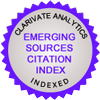
Kent içi otobüs memnuniyet anketi verileri ve faktör analizinden yararlanılarak otobüslerin hizmet kalitesinin modellenmesi: İETT örneği
Ilgın Gökaşar1, Büşra Buran2, Selim Dündar31Boğaziçi Üniversitesi Mühendislik Fakültesi İnşaat Mühendisliği Bölümü İstanbul2İstanbul Teknik Üniversitesi İşletme Fakültesi İşletme Mühendisliği Bölümü İstanbul
3Okan Üniversitesi Mühendislik Fakültesi İnşaat Mühendisliği Bölümü İstanbul
Hizmet kalitesi, 1980lerden bu yana, önemli bir konu olarak değerlendirilmektedir. Kişiden kişiye farklılık gösterebildiği ve somut bir çıktı üretmediği için, hizmet kalitesinin ölçümü, ürün kalitesine kıyasla daha zordur. Hizmet kalitesinin değerlendirilmesi için, literatürde çok sayıda model geliştirilmiştir. Ulaştırma iş kolu, hizmet iş kolunun önde gelen bileşenlerinden birisidir. Toplu taşımanın kalitesinin arttırılması, kentlerin gelişiminde ve özel araç kullanımının toplu ulaşıma yönlendirilmesinde kuvvetli bir etkendir. Otobüs hizmetlerinin kalitesi, toplu ulaşımın kalitesinin ölçülmesine olanak sağlayan TS-EN 13816 Standardına göre tanımlanmıştır. İstanbulda otobüsler için hizmet kalite ölçütleri belirlenmiş olup performansları sistematik bir şekilde ölçülmektedir. Bu çalışma kapsamında, otobüs hizmetlerinin kalitesinin değerlendirmek için, İETT tarafından internet üzerinden kullanıcılara uygulanan memnuniyet anketlerinin 2177 tanesinin sonuçları kullanılarak faktör analizi uygulanmış ve çoklu doğrusal regresyon modeli oluşturulmuştur. Ortaya çıkan 2 faktör incelendiğinde, kullanıcıların hizmete erişime, konfordan daha fazla önem verdikleri ortaya çıkmıştır. Ayrıca, kullanıcı anketlerinin sonuçları, hizmet sağlayıcıların görüşleri ile karşılaştırılmış, iki kesimin görüşü arasında yalnızca %1.733lik fark gözlemlenmiştir.
Anahtar Kelimeler: Otobüs hizmetleri, Kalite değerlendirilmesi, Hizmet kalitesi, Faktör analizi, Çoklu doğrusal regresyon
Modelling the quality of bus services by using factor analysis on urban bus satisfaction survey data: Case of IETT
Ilgın Gökaşar1, Büşra Buran2, Selim Dündar31Bogazici University Engineering Faculty Civil Engineering Department Istanbul2Istanbul Technical University Faculty of Management Management Engineering Department Istanbul
3Okan University Engineering Faculty Civil Engineering Department Istanbul
Service quality has been regarded as an important issue since the 1980s. The measurement of service quality is harder than the quality of the product, since it varies from person to person and produces no concrete output. A number of models have been developed in the literature to assess service quality. The transportation sector is one of the leading components of the service sector. Increasing the quality of public transport has a strong influence in the development of cities and decreasing the usage of private cars. The quality of bus services is defined in accordance with TS-EN 13816 Standard, which allows measurement of the quality of public transport. In Istanbul, service quality criteria for buses are determined and their performance is measured systematically. In this study, factor analysis was applied to evaluate the quality of the bus services using the results of the Satisfaction Surveys applied by IETT to 2177 users on the internet and a multiple linear regression model was developed. When the two emerging factors are examined, it is seen that users pay more importance to access to the service than the comfort. In addition, the results of user surveys were compared with the views of service providers, and a difference of only 1.733% was observed between the two groups views.
Keywords: Bus services, Quality evaluation, Service quality, Factor analysis, Multiple linear regression
Makale Dili: Türkçe



